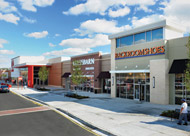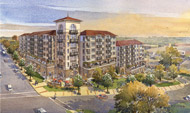|
COVER STORY, MARCH 2012
ON STEADIER FOOTING
The Carolinas are seeing retail activity climb back quickly after the slowdown.
Savannah Duncan
The retail market in the Carolinas is on the upswing as leasing activity perks up, although it’s not back yet to pre-recession levels. Development is back on a limited basis after remaining largely stalled in 2011. The bright spot has definitely been shopping center sales, with several transactions reaching $20 million, and some even surpassing $90 million.
Despite enduring some of the highest unemployment rates in the country — 9.5 percent for South Carolina and 9.9 percent for North Carolina as of late January — the economic future remains bright for these two states, says Robert Spratt, president and CEO of Charlotte, North Carolina-based Hill Partners. “The lifestyle, climate and cost of living in the Carolinas are all very attractive,” he says.
That confidence is bolstered by BMW’s plan to invest $900 million in its manufacturing facility in Spartanburg, South Carolina, and Chiquita’s decision to relocate its national headquarters from Cincinnati to Charlotte.
“Real estate values are beginning to recover in several markets in the Carolinas, despite the challenges of unemployment, consumer confidence and online shopping,” says Karen Christy, research and marketing director of Collier’s International’s Raleigh office.
“To the commercial real estate industry, these challenges provide the opportunity to continue to solve problems for clients,” adds Christy.
Leasing on the Rise
Compared to this time last year, activity has improved quite a bit, observes Pete Brett, who specializes in retail and development at Greenville, South Carolina-based Coldwell Banker Commercial Caine. “Vacancies are down, rates are stabilizing and even up in some of the stronger centers, and absorption overall has been pretty positive.”
According to Colliers International, absorption has been trending positive for some time in several markets, most notably in Charlotte, Greensboro and Raleigh/Durham, North Carolina, and Charleston and Columbia, South Carolina. Each of those markets has a vacancy rate below 10 percent.
“The South Carolina retail market has experienced substantial activity following the last economic downturn, as many of the big boxes left vacant during the recession have since been filled,” points out Christy says. “Leasing activity in North Carolina is picking up slowly and is steady heading into 2012, with most major markets obtaining positive net absorption.”
“Retailers that are still around are looking to add stores because they have to grow and they have had limited opportunities to do so,” says Chris Fraser, president of investment sales and office leasing at Grubb & Ellis/WRS Realty.
With little development slated to come on line this year, owners of Class A shopping centers are taking the opportunity to strengthen their assets, says Susan McGuire, principal of CNL Crosland Commercial Real Estate’s Charlotte office. “Strong centers are getting stronger, and borderline centers are getting weaker.”
Overcoming Obstacles
For new retailers looking to enter the Carolinas, finding sites is a challenge because many premium big boxes that went dark have already been filled. Similarly, a significant portion of Class A space in prime centers has been taken.
“The region continues to have strong interest from retailers new to the market, and some are having difficulty finding the space they need in Class A centers in their target areas,” says Elizabeth Gates, principal and senior vice president of marketing and research in Grubb & Ellis/Thomas Linderman Graham’s Raleigh office.
Some big-box retailers are signing leases to expand in nearby markets, says Michael Lebovitz, executive vice president of development at Chattanooga, Tennessee-based CBL & Associates Properties, which owns several centers in the Carolinas.
Kohl’s, which was already operating stores in Raleigh and Greensboro, opened a 92,658-square-foot store at CBL’s 690,020-square-foot Alamance Crossing center in Burlington, North Carolina, in September 2011.
Daniel Taub, executive vice president and COO of Tarrytown, New York-based DLC Management Corp., says securing small shop tenants is more of a challenge than large tenants.
“The biggest challenge is sourcing viable existing and potentially new small shop, mom-and-pop tenants who either have an existing business or have the capital and ability to start a new business,” he says. “While our analysis tells us that it’s a worthwhile investment to help them relocate, expand or open a new store, it’s still a challenge.”
When it comes to lease negotiations, Taub says national tenants are still in a position of leverage, but in certain markets it has become an even playing field.
“With construction limited and a dwindling supply of space in the region’s prime locations, the market is slowly shifting back in favor of the landlords in select areas,” says Jack Graham, executive vice president and principal at Grubb & Ellis/Thomas Linderman Graham’s Chapel Hill, North Carolina, office.
Strength in Numbers
Investment demand for retail properties increased in 2011, with $377 million of sales volume in North Carolina’s Triangle Region, Gates says, which is more than double the volume witnessed in 2010. “Well-leased, grocery-anchored centers remain the most sought after retail class.”
Andrew Margulies, associate in Marcus & Millichap’s Raleigh office and a member of the firm’s National Retail Group, says last year the company closed 60 investment sales in the Carolinas. Approximately 76 percent were net-lease transactions and about 24 percent were multi-tenant shopping center sales.
Robin Hilliard, area vice president of leasing for Weingarten Realty’s Raleigh office adds that core and distressed assets gather the most interest. “Core assets are selling at a fairly low cap rate and distressed assets are trading at a pretty good value because of value-add properties, but for properties in the middle, there’s just no demand for them,” she says.
Two of the largest sales of the year occurred in Charlotte. In September, DDR Corp. purchased the 258,000-square-foot Cotswold Village Shops and the 28,600-square-foot Terraces at SouthPark in Charlotte from Bell Partners for $85 million.
Additionally, EDENS purchased the 400,000-square-foot Park Road Shopping Center, also in Charlotte, in July 2011 for $82 million.
The largest sale last year was Inland American Real Estate Trust’s $95 million acquisition of the 549,000-square-foot White Oak Crossing Shopping Center, located in the Raleigh suburb of Garner, North Carolina, from local developer Collett & Associates.
Development Activity
The Carolinas market had been actively developing until 3 to 4 years ago, says Joe Baranowski, president and COO of East Berlin, Connecticut-based Developers Realty Corp. “The development market right now is extremely difficult. That’s not to say if the right opportunity came along that we wouldn’t take a look at it, but at the moment we are just trying to manage, lease and maintain the space we have.”
While many developers are still not prepared to start new projects, there are a few major projects underway.
 |
In October 2011, a 138,047-square-foot Target opened at Phase I of the 700,000-square-foot retail portion of CASTO’s
Park West Village, located in Cary, North Carolina. Construction has started for an additional 275,00 square feet of retail space. |
|
In October 2011, a 138,047-square-foot Target opened at Phase I of the 700,000-square-foot retail portion of CASTO’s 100-acre Park West Village, located in Cary. Since then, other tenants have opened, including Omega Sports, T.J. Maxx and PetSmart. Construction has started for an additional 275,00 square feet of retail space. The first tenants are slated to open this winter.
Chris Thomas, partner of Childress Klein Properties’ Charlotte office, says the company is expanding its 545,000-square-foot RiverGate shopping center in Charlotte. “We are petitioning to add as much as an additional 155,000 square feet of retail space and 100,000 square feet of office space,” he says. The company intends to break ground later this year, and open in 2013.
In Fayetteville, CBL is redeveloping the 1.04 million-square-foot Cross Creek Mall. Additionally, Lebovitz says the company is in the early stages of expansion. CBL is also developing the 127,000-square-foot Waynesville Commons, located in Waynesville, North Carolina. Construction began in September 2011, and completion is slated for October of this year. An 85,000-square-foot Belk will anchor the property, which will also include Michaels, PetSmart and an additional 11,000 square feet of retail space.
In January, Mount Pleasant, South Carolina-based WRS Realty broke ground on a 450,000-square-foot power center, located on the former site of the Henredon manufacturing facility in Morganton, North Carolina. A 177,000-square-foot Walmart, T.J. Maxx, Ross Dress For Less and Pet-Smart will anchor the center, which is 75 percent pre-leased. “It’s a regional center that will serve more than just the Morganton area,” Fraser says.
Phase I is slated for completion in the summer of 2013. WRS will manage development and leasing/sale activities on behalf of the owner, Morganton Retail Investment. Southern Real Estate Management will manage the center.
 |
Hill Partners is working with Crescent Resources on Gallery at Cameron Village,
a 282-unit apartment development in Raleigh, North Carolina,
with 17,000 square feet of street-level retail. |
|
One way retail space is being added is through mixed-use projects. Spratt says Hill Partners is currently working with Crescent Resources on Gallery at Cameron Village in, a 282-unit apartment development in Raleigh with 17,000 square feet of street-level retail. The retail space is 99 percent pre-leased. Ground breaking occurred in August 2011, with completion slated for spring 2013.
No Small Plans
Without a doubt, one of the largest development projects at the moment is Magnolia Park in Greenville, South Carolina. Currently, there is 700,000 square feet of retail space on the site. Marc Yavinsky, executive vice president of Palm Beach, Florida-based Menin Development, says the company is actively working to add 400,000 square feet of retail space to the site. Additionally, the site can hold up to 375,000 square feet of office space, 350 hotel rooms and several hundred apartment units.
 |
Menin Development is adding an additional 400,000 square feet of retail space to its Magnolia Park project in Greenville, South Carolina. |
|
Another large project that’s expected to break ground in late 2012 or early 2013 is the 800,000-square-foot The Edge, a multiple-use project in Chapel Hill that will include 450,000 square feet of retail space, 400 to 500 multifamily residential units, 80,000 square feet of office space, two hotel sites and small scale office uses.
A partnership between Sonny Molloy, Jeff Pape, president of D&A Development & Consulting and The Rosen Group is developing the property. The Shopping Center Group has been retained as the leasing agent for the project.
©2012 France Publications, Inc. Duplication
or reproduction of this article not permitted without authorization
from France Publications, Inc. For information on reprints
of this article contact Barbara
Sherer at (630) 554-6054.
|
